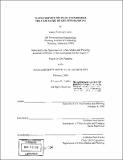| dc.contributor.advisor | Paul Smoke. | en_US |
| dc.contributor.author | Lukito, Lastyo Kuntoaji, 1972- | en_US |
| dc.contributor.other | Massachusetts Institute of Technology. Dept. of Urban Studies and Planning. | en_US |
| dc.date.accessioned | 2012-01-12T19:21:15Z | |
| dc.date.available | 2012-01-12T19:21:15Z | |
| dc.date.copyright | 2000 | en_US |
| dc.date.issued | 2000 | en_US |
| dc.identifier.uri | http://hdl.handle.net/1721.1/68363 | |
| dc.description | Thesis (M.C.P.)--Massachusetts Institute of Technology, Dept. of Urban Studies and Planning, 2000. | en_US |
| dc.description | Includes bibliographical references (leaves 90-91). | en_US |
| dc.description.abstract | Greater Bandung Area in Indonesia have taken the lead in a City Development Strategy (CDS) exercise. This exercise is supported by the World Bank and the government of Japan, and is partly aimed to improve urban planning and management capabilities of the local governments to ensure more efficient utilization of available resources. The exercise has identified water service delivery as a focus sector, thus creating the setting and background for this thesis research. Various problems faced by the two water companies (the PDAMs) in providing water service delivery to Greater Bandung are common in most PDAMs in Indonesia, leading to weak performance in water provision. The elements of substandard performance include low level of service coverage, poor reliability, low water production and the inability to meet current and future demands. Underlying these problems is a variety of technical, structural and procedural problems. These include inadequate water resource management, operation and maintenance problems (i.e. water production and unaccounted for water), and weak financial and human resource management. This study also identifies a series of legal, institutional and political factors that affect the ability and incentive for PDAMs to perform well. The alternatives to improve water service delivery in Greater Bandung involve implementation of technical reforms, management reforms and capacity building, and institutional reforms. Technical reforms include reforms in water resource management and in operations and maintenance. Management reforms include financial and human resource capacity building. Institutional restructuring, political reforms, private sector participation and improving investment strategies, are among the most important institutional reforms. Design and implementation of these reforms must be consistent with the decentralization policy that is currently evolving in Indonesia, a focal point of the CDS exercise. | en_US |
| dc.description.statementofresponsibility | by Lastyo Kuntoaji Lukito. | en_US |
| dc.format.extent | 101 leaves | en_US |
| dc.language.iso | eng | en_US |
| dc.publisher | Massachusetts Institute of Technology | en_US |
| dc.rights | M.I.T. theses are protected by
copyright. They may be viewed from this source for any purpose, but
reproduction or distribution in any format is prohibited without written
permission. See provided URL for inquiries about permission. | en_US |
| dc.rights.uri | http://dspace.mit.edu/handle/1721.1/7582 | en_US |
| dc.subject | Urban Studies and Planning. | en_US |
| dc.title | Water service delivery in Indonesia : the case study of Greater Bandung | en_US |
| dc.type | Thesis | en_US |
| dc.description.degree | M.C.P. | en_US |
| dc.contributor.department | Massachusetts Institute of Technology. Department of Urban Studies and Planning | |
| dc.identifier.oclc | 45382975 | en_US |
